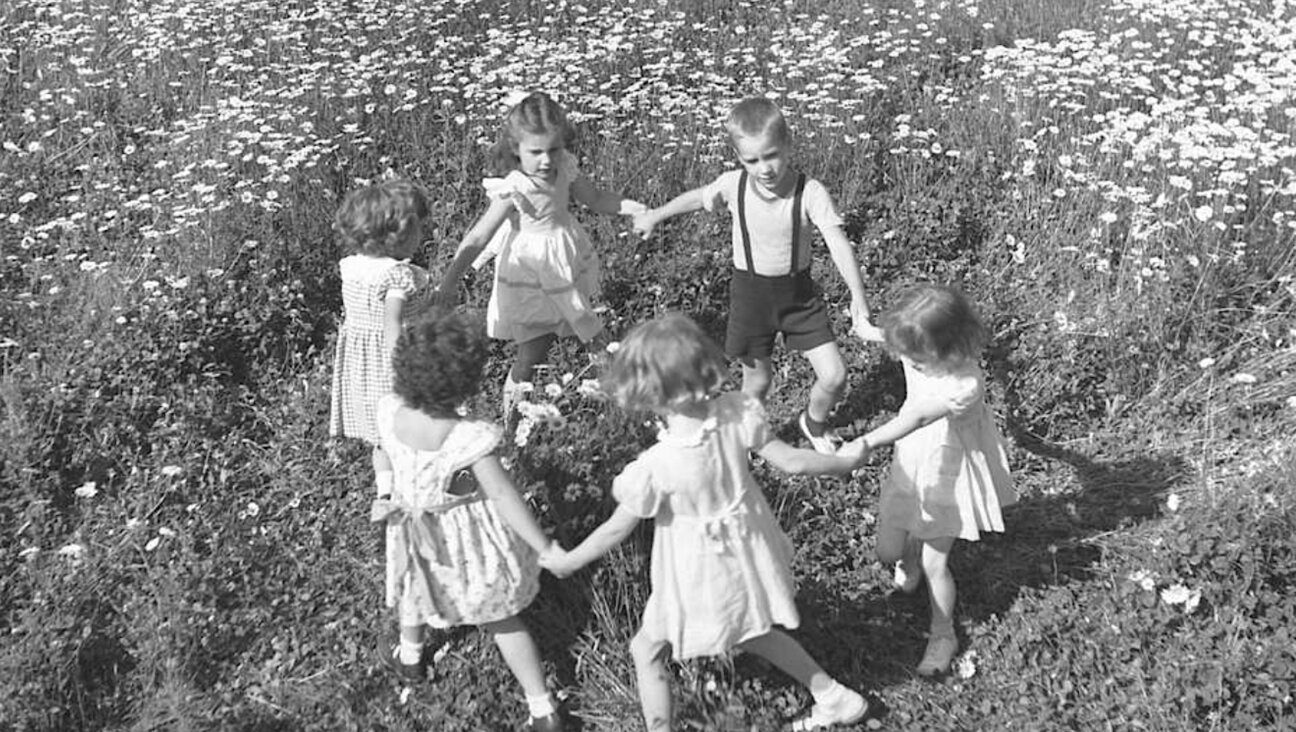Replacement for a Child Lost

In Her Place: A doctor told Florence Mandel (left, with 1-year-old Judy Mandel) that having another child would ease her suffering. Image by Courtesy of Judy Mandel
When violence such as the Newtown, Conn., massacre or the Boston bombings erupts, the typical narrative tells us that the victims’ lives end or are forever altered. But sometimes, new life emerges from the ashes. Memoirist Judy Mandel was conceived after the sister she never knew perished.
“I was born of fire,” begins her new book, “Replacement Child” (Seal Press).
The horrifying event that forms the basis of Mandel’s memoir occurred in 1952, when American Airlines Flight 6780 crashed into her family’s New Jersey home. The accident ripped a figurative as well as literal hole in the family’s heart; one daughter, 7-year-old Donna, was killed, and the other, 2-year-old Linda, was seriously wounded.
Investigators never determined the cause of the crash, one in a string of three fatal plane crashes that happened in the area and led to a presidential commission on airport safety and a temporary closure of Newark Airport.
In the years following Donna’s death and Linda’s slow, painful and surgery-laden recovery, Mandel’s mother, Florence Mandel, suffered from depression and was told by a doctor to have another child. Judy was born two years after the crash.
“My mother must have been haunted by that her whole life. It led to her depression, but it’s also amazing that she could go on and have a full life after that,” Mandel told me over coffee in April. We were at the Midtown Manhattan hotel she was staying at before going to a women’s book fair.
There, as she does in her appearances around the country, she would talk about both her personal journey and her unusual publishing one, entwined trajectories that have garnered her a considerable following in the memoir world.
When Mandel was growing up, her parents rarely talked explicitly about the crash or about the loss of their daughter. As a child, Mandel writes, she felt an emptiness, a sorrow whose source was veiled from her.
“The yahrtzeit candle would come out for my sister’s yahrtzeit, but they never told me what it was,” she said. Eventually Mandel pieced together the stories she overheard and the references to the “accident” her relatives assumed she knew about. She finally learned the complete truth from her parents when she asked for their permission to fly to Florida as a teen. Her parents never flew themselves, but they reluctantly allowed her to go.
Mandel had to process that her own life was meant to be, she writes, her family’s “salvation,” the salve on the burn. Her relationship with her parents was tangled up in their truncated attachment to Donna. Adding to the pain, Mandel’s parents often talked about how perfect Donna was, a daunting memory for a spirited girl to live up to.
Mandel’s presence was “alternately a blessing and a painful reminder” to her parents, she writes in “Replacement Child.” Up until her father’s death, his love mostly came across as fretful and overprotective rather than affectionate. Mandel wrote that her father’s attitude influenced her, leading her into a series of failed marriages and relationships with men.
“It’s true we marry our mothers and fathers in some sense,” she writes of her ex-husband, Steven. “His emotional distance drew me to him like a long-lost relative.”
The book is filled with Jewish references. The day of the crash, a few neighborhood children came over to the house so that Florence could help them practice for a skit they would perform at Temple Beth El — a pedestrian moment in a life that was about to be shattered.
The funeral for Donna, which Florence and Linda were too ill to attend, as well as three b’nai mitzvot — Linda’s, Mandel’s, and later, Mandel’s son’s — signify the family’s perseverance after the crash, milestones along its journey. “The party had a carnival feel, a kind of wild abandon,” Mandel writes of her own bat mitzvah, while her sister Linda’s was a tearful affair. Mandel learned Hebrew because her mother wanted someone in the family to recite the Kaddish she didn’t know how to say for her dead daughter.
In writing her book, Mandel pieced together the story of the day of the crash through painstaking research: newspaper clippings, photos, public records, interviews with friends and other survivors.
“The difficult part of it was, I wasn’t there for any of it — the accident, the plane crash, my sister and her surgeries when she was very little, or even the years when I was young and didn’t know,” she said. “How do you structure something from the past but really be true to what happened?”
Some of her most painful source material arose from her mother’s attempt to relay her version of the day, on yellow legal pads she left for Mandel. “Every time she wrote it, it was the same. She thought the furnace blew up. She heard Donna calling her.
Imagine that: The last thing you hear is your child calling you,” Mandel said. Donna was pinned beneath a beam, unable to escape, while Linda, the baby, was on fire. “She questioned herself forever about that, because she ran down to help Linda out of the door and in the meantime she didn’t get Donna out.”
Mandel’s own urge to publish the story surfaced after her parents passed away within one year of each other. In the first chapter of “Replacement Child,” she describes losing them both and saying Kaddish as her family spreads their ashes. Her parents chose to be cremated in homage to their daughter lost in the flames — counter to Jewish custom, but right for them.
“I started to think, I’m not going to live forever,” Mandel said. She wanted to write the family story as a legacy for her son, Justin Butler, who is in his mid-20s and lives in Brooklyn.
The writing process was arduous; it took her 10 or 11 revisions to work out the structure for the book. What eventually emerged from the process, numerous writing classes and conferences (I first met Mandel at one such conference, in 2008) was an imaginative, anguished but clear retelling of the fateful day of the crash, interspersed with stories of her childhood of rebellion against Donna’s angelic image, of her period of daredevil activity as a young woman — including the time she flew a glider plane — and of her long struggle to find a lasting partnership.
Despite the fact that editors and agents were fascinated by Mandel’s project, they kept telling her they weren’t sure they could sell it. So after a year, she published under her own imprint, eventually selling more than 14,000 copies, many of them ebooks. Her marketing background and the appeal of her story helped.
“The response was slow to build. It was a dribbling response when I first started. I did do a lot of marketing, and the ebook really caught on,” she said.
With impressive sales numbers to demonstrate, Mandel got back in touch with an agent she’d met at a conference; she inked a book deal with Seal Press soon thereafter. As a result of her rare move to one form of publishing from another, she’s become an object of fascination among aspiring writers. But she’s also inspired intense responses from readers who identify with the sense of alienation she chronicles in the book, her feeling that the camera of her family’s life was always zooming away from her.
“When I do readings, invariably one or two people come up and say, ‘I think I am a replacement child, too,’” she said. “I have a lot of those conversations. They want to know things like: ‘If I’m adopted, could I feel this way?’ ‘Would it have to have happened before I was born?’”
Remarkably, Mandel has heard from others who were touched by the same crash that killed her sister: She’s read the blog posts by the pilot’s daughter, and was contacted by the daughter of a man who lived upstairs from Mandel’s family. This woman never knew that her father had loved and lost a previous family, and like Mandel, she found answers about her life in the story of the crash.
Mandel believes that the midcentury brand of secrecy surrounding the “accident,” as her family called it, has ebbed somewhat in our oversharing society — but not entirely and perhaps not enough.
“People have asked me, if they’ve lost a child and they want another child, how can they guard from a negative influence? I tell them it’s all about talking about it, giving some reality to that deceased child,” she said. She notes that she appreciates the custom of shiva because it coaxes forth talking and storytelling.
Now, with her memoir and a blog on Psychology Today, Mandel talks all the time about “the accident” and its effect on her life, painful as it is. And the strong pull that her story exerts over others who suffered goes both ways: Whenever there is a public tragedy, Mandel feels personally obligated to use her life’s example to offer the comfort of understanding, if not to give answers. In doing so, she hopes she’s living up to her parents’ memories.
“Even after the crash, when they were still living in a hotel, they heard about the third plane crash in our area within six weeks,” she said. “They got dressed in middle of the night and went to the hospital to see if they could help.”
Sarah Marian Seltzer is a writer in New York and a contributor to the Forward’s The Sisterhood blog. Find her at www.sarahmseltzer.com.

















